Assessing the BREXIT Impact: UK Food Manufacturing Recruitment Sector
VerifiedAdded on 2020/12/10
|40
|14583
|403
Report
AI Summary
This report investigates the impact of BREXIT on the United Kingdom's recruitment sector, specifically within the food manufacturing industry. The study begins with an introduction to BREXIT and its implications, followed by a literature review examining the importance of free movement for recruitment, the role of migrant workers, and the potential for staff shortages. The research methodology outlines the approach, strategy, and data analysis techniques employed. The findings section presents data analysis addressing the research questions, including the significance of free movement, the role of EU labor, and the anticipated impact of BREXIT on staffing levels. The report concludes with a summary of the findings, research limitations, suggestions for further research, and overall conclusions regarding the impact of BREXIT on the UK's food industry recruitment sector, highlighting the challenges and potential solutions for businesses in adapting to the changing landscape. The study also emphasizes the need for recruitment companies to evolve into employment consultants to assist clients and candidates in achieving their goals.
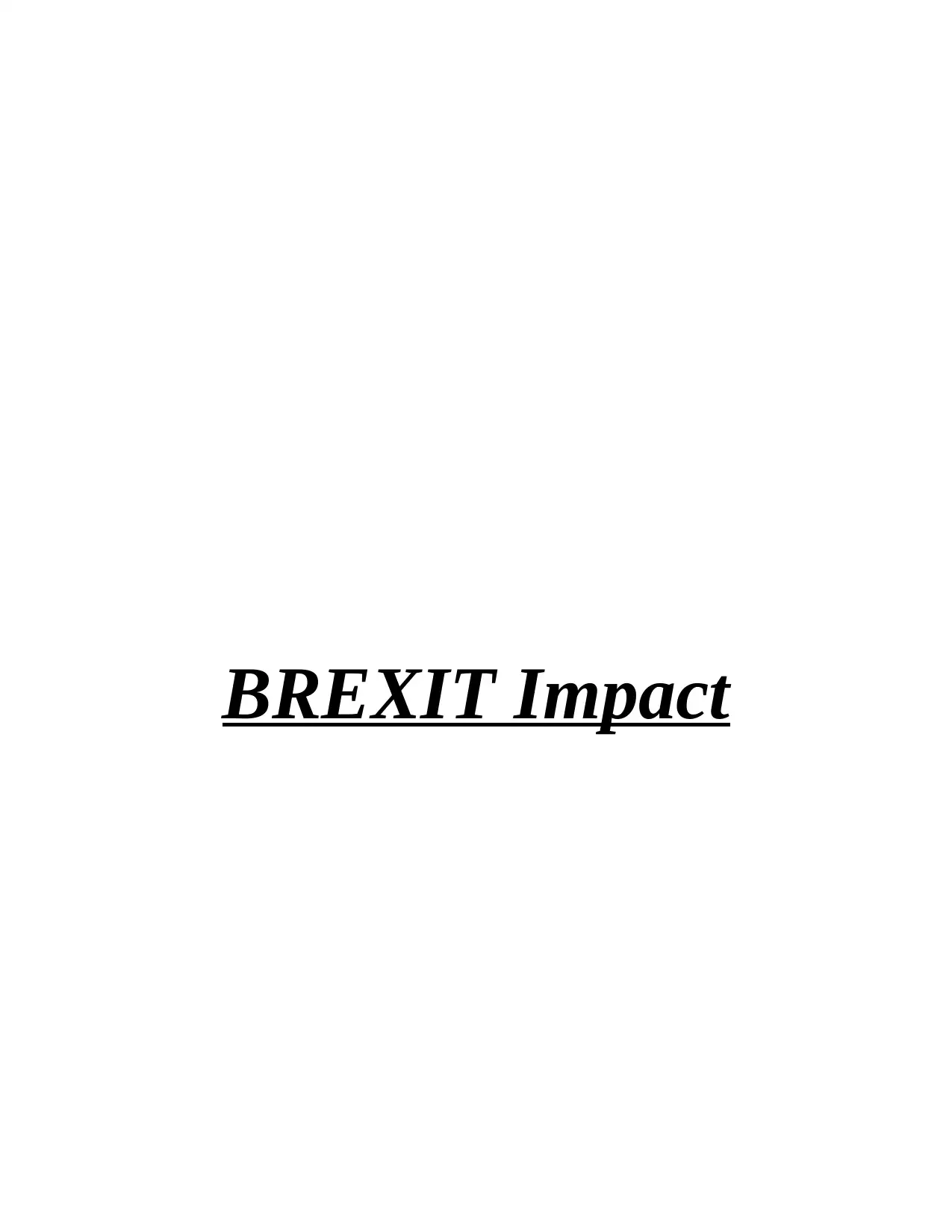
BREXIT Impact
Paraphrase This Document
Need a fresh take? Get an instant paraphrase of this document with our AI Paraphraser
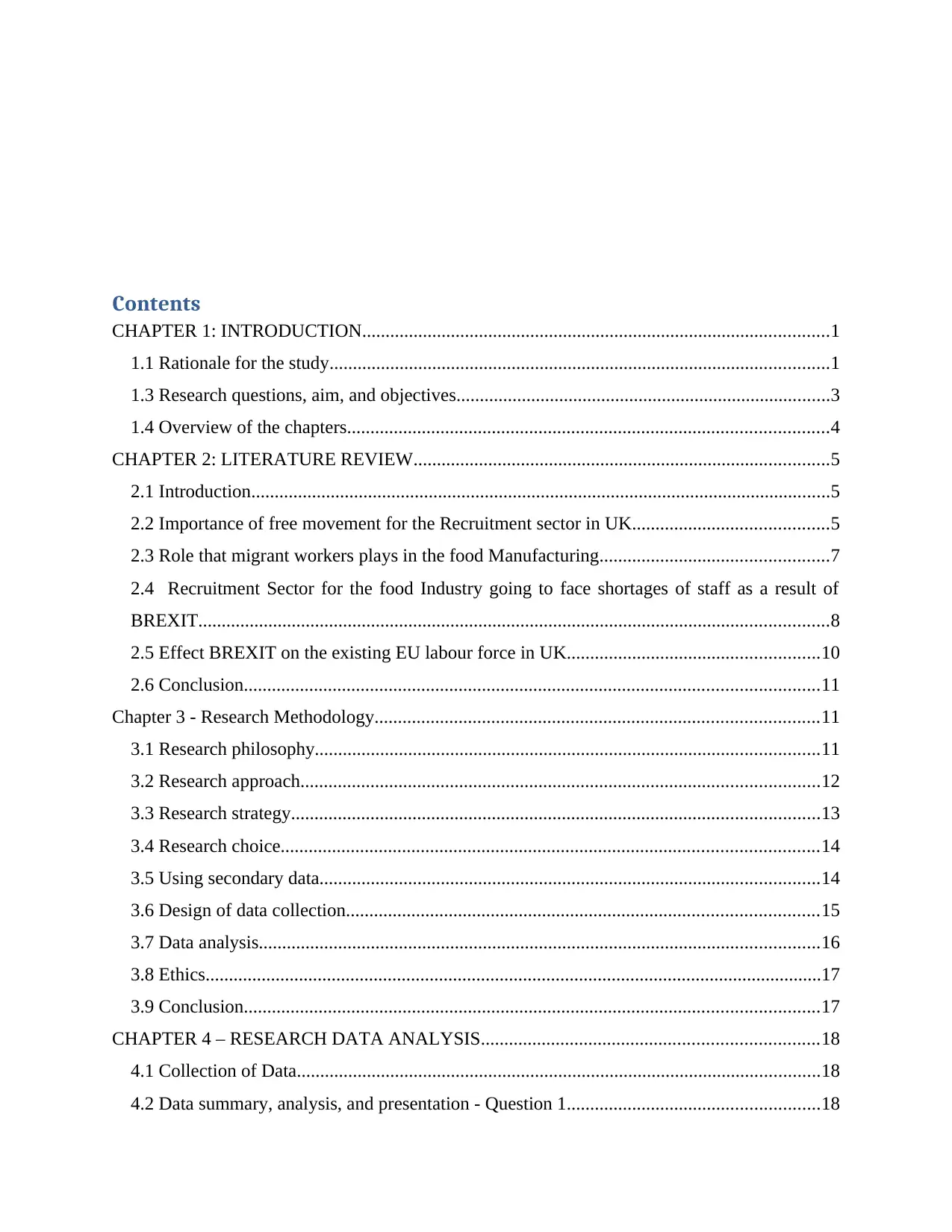
Contents
CHAPTER 1: INTRODUCTION....................................................................................................1
1.1 Rationale for the study...........................................................................................................1
1.3 Research questions, aim, and objectives................................................................................3
1.4 Overview of the chapters.......................................................................................................4
CHAPTER 2: LITERATURE REVIEW.........................................................................................5
2.1 Introduction............................................................................................................................5
2.2 Importance of free movement for the Recruitment sector in UK..........................................5
2.3 Role that migrant workers plays in the food Manufacturing.................................................7
2.4 Recruitment Sector for the food Industry going to face shortages of staff as a result of
BREXIT.......................................................................................................................................8
2.5 Effect BREXIT on the existing EU labour force in UK......................................................10
2.6 Conclusion...........................................................................................................................11
Chapter 3 - Research Methodology...............................................................................................11
3.1 Research philosophy............................................................................................................11
3.2 Research approach...............................................................................................................12
3.3 Research strategy.................................................................................................................13
3.4 Research choice...................................................................................................................14
3.5 Using secondary data...........................................................................................................14
3.6 Design of data collection.....................................................................................................15
3.7 Data analysis........................................................................................................................16
3.8 Ethics....................................................................................................................................17
3.9 Conclusion...........................................................................................................................17
CHAPTER 4 – RESEARCH DATA ANALYSIS........................................................................18
4.1 Collection of Data................................................................................................................18
4.2 Data summary, analysis, and presentation - Question 1......................................................18
CHAPTER 1: INTRODUCTION....................................................................................................1
1.1 Rationale for the study...........................................................................................................1
1.3 Research questions, aim, and objectives................................................................................3
1.4 Overview of the chapters.......................................................................................................4
CHAPTER 2: LITERATURE REVIEW.........................................................................................5
2.1 Introduction............................................................................................................................5
2.2 Importance of free movement for the Recruitment sector in UK..........................................5
2.3 Role that migrant workers plays in the food Manufacturing.................................................7
2.4 Recruitment Sector for the food Industry going to face shortages of staff as a result of
BREXIT.......................................................................................................................................8
2.5 Effect BREXIT on the existing EU labour force in UK......................................................10
2.6 Conclusion...........................................................................................................................11
Chapter 3 - Research Methodology...............................................................................................11
3.1 Research philosophy............................................................................................................11
3.2 Research approach...............................................................................................................12
3.3 Research strategy.................................................................................................................13
3.4 Research choice...................................................................................................................14
3.5 Using secondary data...........................................................................................................14
3.6 Design of data collection.....................................................................................................15
3.7 Data analysis........................................................................................................................16
3.8 Ethics....................................................................................................................................17
3.9 Conclusion...........................................................................................................................17
CHAPTER 4 – RESEARCH DATA ANALYSIS........................................................................18
4.1 Collection of Data................................................................................................................18
4.2 Data summary, analysis, and presentation - Question 1......................................................18
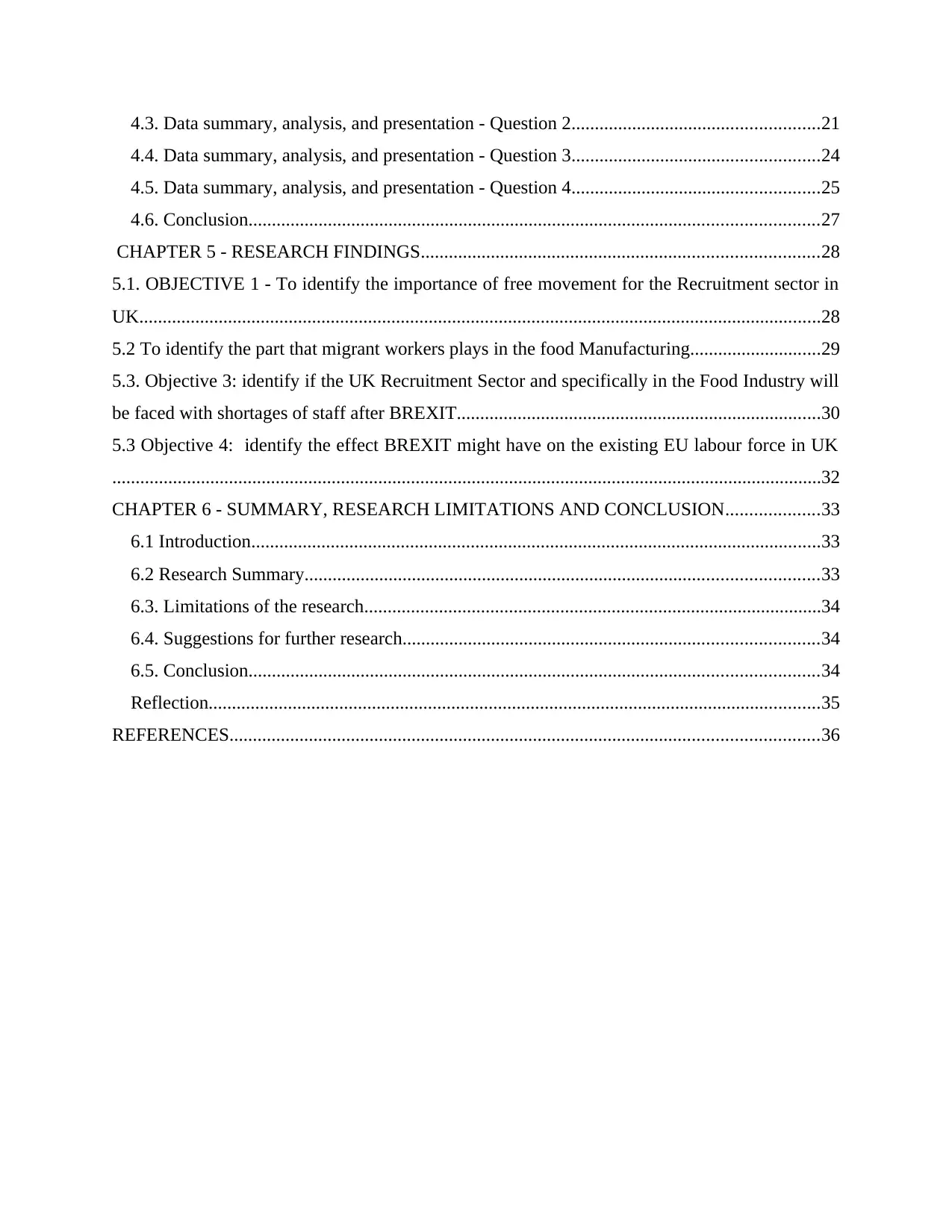
4.3. Data summary, analysis, and presentation - Question 2.....................................................21
4.4. Data summary, analysis, and presentation - Question 3.....................................................24
4.5. Data summary, analysis, and presentation - Question 4.....................................................25
4.6. Conclusion..........................................................................................................................27
CHAPTER 5 - RESEARCH FINDINGS.....................................................................................28
5.1. OBJECTIVE 1 - To identify the importance of free movement for the Recruitment sector in
UK..................................................................................................................................................28
5.2 To identify the part that migrant workers plays in the food Manufacturing............................29
5.3. Objective 3: identify if the UK Recruitment Sector and specifically in the Food Industry will
be faced with shortages of staff after BREXIT..............................................................................30
5.3 Objective 4: identify the effect BREXIT might have on the existing EU labour force in UK
........................................................................................................................................................32
CHAPTER 6 - SUMMARY, RESEARCH LIMITATIONS AND CONCLUSION....................33
6.1 Introduction..........................................................................................................................33
6.2 Research Summary..............................................................................................................33
6.3. Limitations of the research..................................................................................................34
6.4. Suggestions for further research.........................................................................................34
6.5. Conclusion..........................................................................................................................34
Reflection...................................................................................................................................35
REFERENCES..............................................................................................................................36
4.4. Data summary, analysis, and presentation - Question 3.....................................................24
4.5. Data summary, analysis, and presentation - Question 4.....................................................25
4.6. Conclusion..........................................................................................................................27
CHAPTER 5 - RESEARCH FINDINGS.....................................................................................28
5.1. OBJECTIVE 1 - To identify the importance of free movement for the Recruitment sector in
UK..................................................................................................................................................28
5.2 To identify the part that migrant workers plays in the food Manufacturing............................29
5.3. Objective 3: identify if the UK Recruitment Sector and specifically in the Food Industry will
be faced with shortages of staff after BREXIT..............................................................................30
5.3 Objective 4: identify the effect BREXIT might have on the existing EU labour force in UK
........................................................................................................................................................32
CHAPTER 6 - SUMMARY, RESEARCH LIMITATIONS AND CONCLUSION....................33
6.1 Introduction..........................................................................................................................33
6.2 Research Summary..............................................................................................................33
6.3. Limitations of the research..................................................................................................34
6.4. Suggestions for further research.........................................................................................34
6.5. Conclusion..........................................................................................................................34
Reflection...................................................................................................................................35
REFERENCES..............................................................................................................................36
⊘ This is a preview!⊘
Do you want full access?
Subscribe today to unlock all pages.

Trusted by 1+ million students worldwide
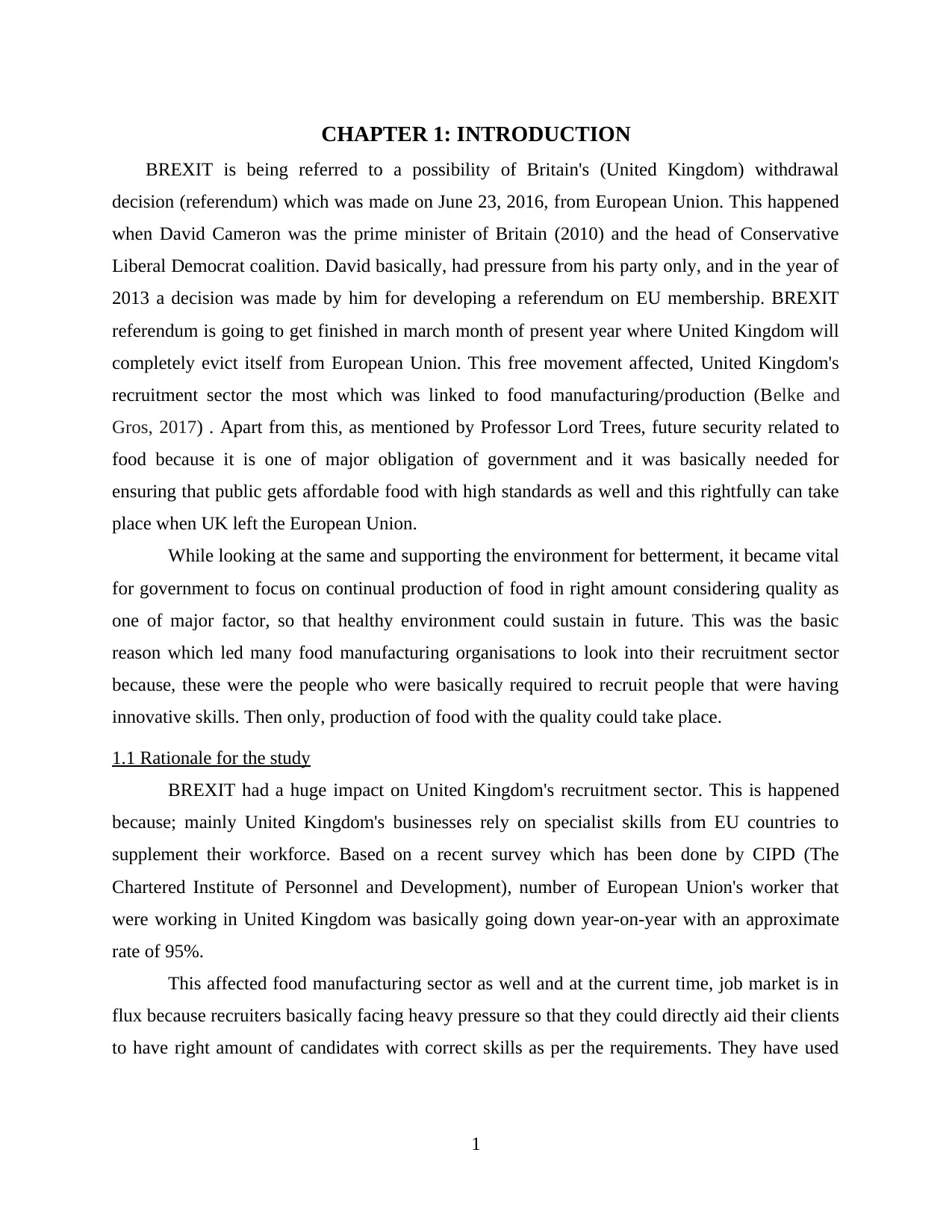
CHAPTER 1: INTRODUCTION
BREXIT is being referred to a possibility of Britain's (United Kingdom) withdrawal
decision (referendum) which was made on June 23, 2016, from European Union. This happened
when David Cameron was the prime minister of Britain (2010) and the head of Conservative
Liberal Democrat coalition. David basically, had pressure from his party only, and in the year of
2013 a decision was made by him for developing a referendum on EU membership. BREXIT
referendum is going to get finished in march month of present year where United Kingdom will
completely evict itself from European Union. This free movement affected, United Kingdom's
recruitment sector the most which was linked to food manufacturing/production (Belke and
Gros, 2017) . Apart from this, as mentioned by Professor Lord Trees, future security related to
food because it is one of major obligation of government and it was basically needed for
ensuring that public gets affordable food with high standards as well and this rightfully can take
place when UK left the European Union.
While looking at the same and supporting the environment for betterment, it became vital
for government to focus on continual production of food in right amount considering quality as
one of major factor, so that healthy environment could sustain in future. This was the basic
reason which led many food manufacturing organisations to look into their recruitment sector
because, these were the people who were basically required to recruit people that were having
innovative skills. Then only, production of food with the quality could take place.
1.1 Rationale for the study
BREXIT had a huge impact on United Kingdom's recruitment sector. This is happened
because; mainly United Kingdom's businesses rely on specialist skills from EU countries to
supplement their workforce. Based on a recent survey which has been done by CIPD (The
Chartered Institute of Personnel and Development), number of European Union's worker that
were working in United Kingdom was basically going down year-on-year with an approximate
rate of 95%.
This affected food manufacturing sector as well and at the current time, job market is in
flux because recruiters basically facing heavy pressure so that they could directly aid their clients
to have right amount of candidates with correct skills as per the requirements. They have used
1
BREXIT is being referred to a possibility of Britain's (United Kingdom) withdrawal
decision (referendum) which was made on June 23, 2016, from European Union. This happened
when David Cameron was the prime minister of Britain (2010) and the head of Conservative
Liberal Democrat coalition. David basically, had pressure from his party only, and in the year of
2013 a decision was made by him for developing a referendum on EU membership. BREXIT
referendum is going to get finished in march month of present year where United Kingdom will
completely evict itself from European Union. This free movement affected, United Kingdom's
recruitment sector the most which was linked to food manufacturing/production (Belke and
Gros, 2017) . Apart from this, as mentioned by Professor Lord Trees, future security related to
food because it is one of major obligation of government and it was basically needed for
ensuring that public gets affordable food with high standards as well and this rightfully can take
place when UK left the European Union.
While looking at the same and supporting the environment for betterment, it became vital
for government to focus on continual production of food in right amount considering quality as
one of major factor, so that healthy environment could sustain in future. This was the basic
reason which led many food manufacturing organisations to look into their recruitment sector
because, these were the people who were basically required to recruit people that were having
innovative skills. Then only, production of food with the quality could take place.
1.1 Rationale for the study
BREXIT had a huge impact on United Kingdom's recruitment sector. This is happened
because; mainly United Kingdom's businesses rely on specialist skills from EU countries to
supplement their workforce. Based on a recent survey which has been done by CIPD (The
Chartered Institute of Personnel and Development), number of European Union's worker that
were working in United Kingdom was basically going down year-on-year with an approximate
rate of 95%.
This affected food manufacturing sector as well and at the current time, job market is in
flux because recruiters basically facing heavy pressure so that they could directly aid their clients
to have right amount of candidates with correct skills as per the requirements. They have used
1
Paraphrase This Document
Need a fresh take? Get an instant paraphrase of this document with our AI Paraphraser
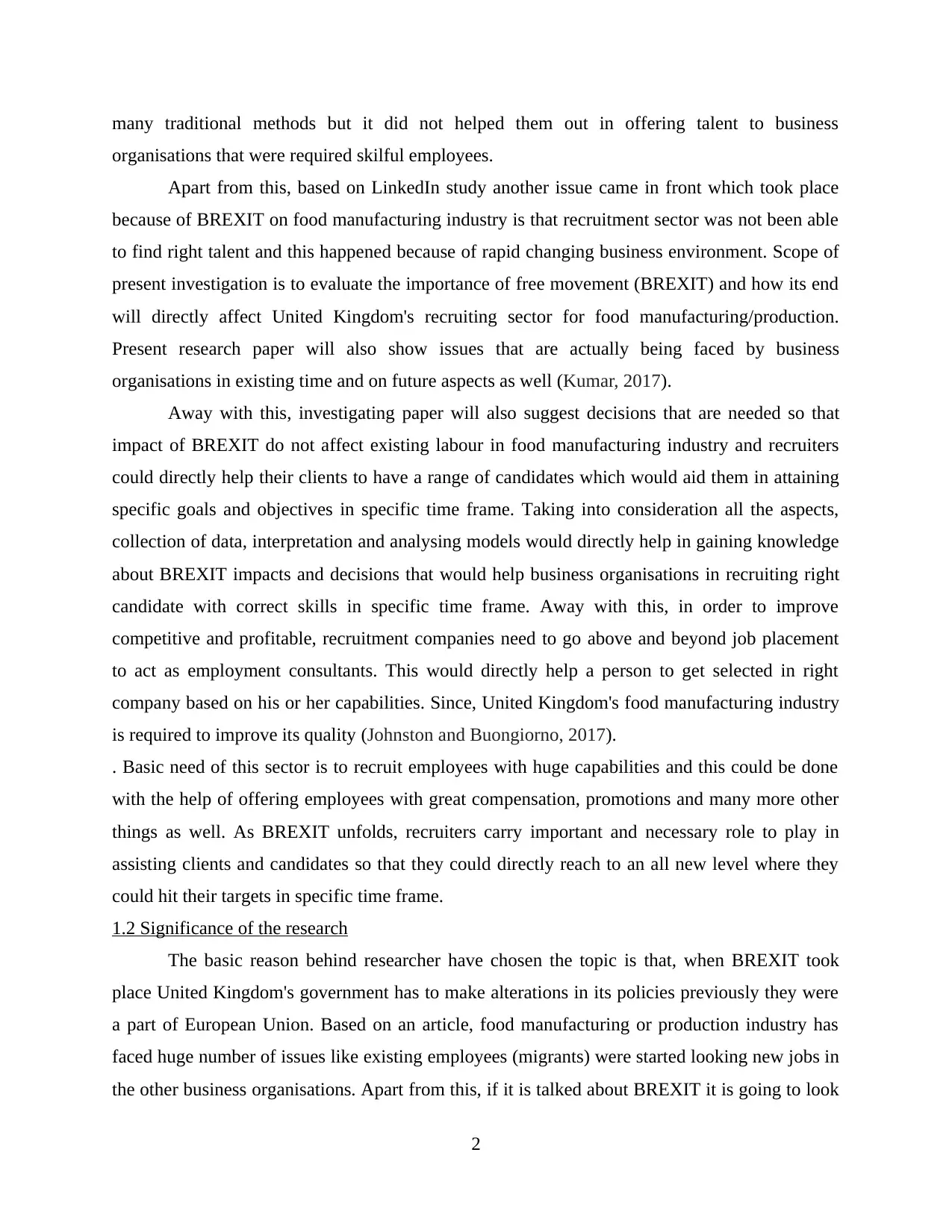
many traditional methods but it did not helped them out in offering talent to business
organisations that were required skilful employees.
Apart from this, based on LinkedIn study another issue came in front which took place
because of BREXIT on food manufacturing industry is that recruitment sector was not been able
to find right talent and this happened because of rapid changing business environment. Scope of
present investigation is to evaluate the importance of free movement (BREXIT) and how its end
will directly affect United Kingdom's recruiting sector for food manufacturing/production.
Present research paper will also show issues that are actually being faced by business
organisations in existing time and on future aspects as well (Kumar, 2017).
Away with this, investigating paper will also suggest decisions that are needed so that
impact of BREXIT do not affect existing labour in food manufacturing industry and recruiters
could directly help their clients to have a range of candidates which would aid them in attaining
specific goals and objectives in specific time frame. Taking into consideration all the aspects,
collection of data, interpretation and analysing models would directly help in gaining knowledge
about BREXIT impacts and decisions that would help business organisations in recruiting right
candidate with correct skills in specific time frame. Away with this, in order to improve
competitive and profitable, recruitment companies need to go above and beyond job placement
to act as employment consultants. This would directly help a person to get selected in right
company based on his or her capabilities. Since, United Kingdom's food manufacturing industry
is required to improve its quality (Johnston and Buongiorno, 2017).
. Basic need of this sector is to recruit employees with huge capabilities and this could be done
with the help of offering employees with great compensation, promotions and many more other
things as well. As BREXIT unfolds, recruiters carry important and necessary role to play in
assisting clients and candidates so that they could directly reach to an all new level where they
could hit their targets in specific time frame.
1.2 Significance of the research
The basic reason behind researcher have chosen the topic is that, when BREXIT took
place United Kingdom's government has to make alterations in its policies previously they were
a part of European Union. Based on an article, food manufacturing or production industry has
faced huge number of issues like existing employees (migrants) were started looking new jobs in
the other business organisations. Apart from this, if it is talked about BREXIT it is going to look
2
organisations that were required skilful employees.
Apart from this, based on LinkedIn study another issue came in front which took place
because of BREXIT on food manufacturing industry is that recruitment sector was not been able
to find right talent and this happened because of rapid changing business environment. Scope of
present investigation is to evaluate the importance of free movement (BREXIT) and how its end
will directly affect United Kingdom's recruiting sector for food manufacturing/production.
Present research paper will also show issues that are actually being faced by business
organisations in existing time and on future aspects as well (Kumar, 2017).
Away with this, investigating paper will also suggest decisions that are needed so that
impact of BREXIT do not affect existing labour in food manufacturing industry and recruiters
could directly help their clients to have a range of candidates which would aid them in attaining
specific goals and objectives in specific time frame. Taking into consideration all the aspects,
collection of data, interpretation and analysing models would directly help in gaining knowledge
about BREXIT impacts and decisions that would help business organisations in recruiting right
candidate with correct skills in specific time frame. Away with this, in order to improve
competitive and profitable, recruitment companies need to go above and beyond job placement
to act as employment consultants. This would directly help a person to get selected in right
company based on his or her capabilities. Since, United Kingdom's food manufacturing industry
is required to improve its quality (Johnston and Buongiorno, 2017).
. Basic need of this sector is to recruit employees with huge capabilities and this could be done
with the help of offering employees with great compensation, promotions and many more other
things as well. As BREXIT unfolds, recruiters carry important and necessary role to play in
assisting clients and candidates so that they could directly reach to an all new level where they
could hit their targets in specific time frame.
1.2 Significance of the research
The basic reason behind researcher have chosen the topic is that, when BREXIT took
place United Kingdom's government has to make alterations in its policies previously they were
a part of European Union. Based on an article, food manufacturing or production industry has
faced huge number of issues like existing employees (migrants) were started looking new jobs in
the other business organisations. Apart from this, if it is talked about BREXIT it is going to look
2
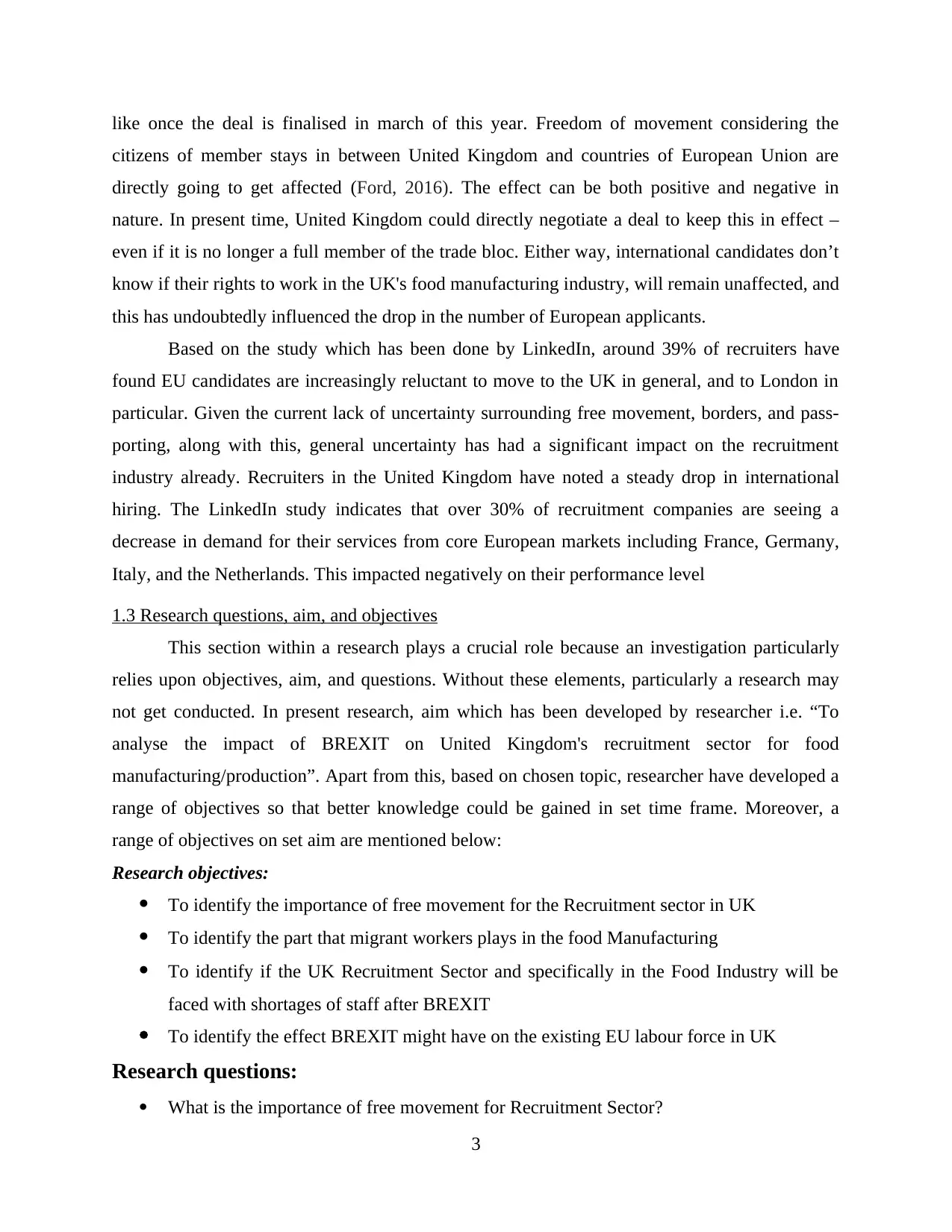
like once the deal is finalised in march of this year. Freedom of movement considering the
citizens of member stays in between United Kingdom and countries of European Union are
directly going to get affected (Ford, 2016). The effect can be both positive and negative in
nature. In present time, United Kingdom could directly negotiate a deal to keep this in effect –
even if it is no longer a full member of the trade bloc. Either way, international candidates don’t
know if their rights to work in the UK's food manufacturing industry, will remain unaffected, and
this has undoubtedly influenced the drop in the number of European applicants.
Based on the study which has been done by LinkedIn, around 39% of recruiters have
found EU candidates are increasingly reluctant to move to the UK in general, and to London in
particular. Given the current lack of uncertainty surrounding free movement, borders, and pass-
porting, along with this, general uncertainty has had a significant impact on the recruitment
industry already. Recruiters in the United Kingdom have noted a steady drop in international
hiring. The LinkedIn study indicates that over 30% of recruitment companies are seeing a
decrease in demand for their services from core European markets including France, Germany,
Italy, and the Netherlands. This impacted negatively on their performance level
1.3 Research questions, aim, and objectives
This section within a research plays a crucial role because an investigation particularly
relies upon objectives, aim, and questions. Without these elements, particularly a research may
not get conducted. In present research, aim which has been developed by researcher i.e. “To
analyse the impact of BREXIT on United Kingdom's recruitment sector for food
manufacturing/production”. Apart from this, based on chosen topic, researcher have developed a
range of objectives so that better knowledge could be gained in set time frame. Moreover, a
range of objectives on set aim are mentioned below:
Research objectives:
To identify the importance of free movement for the Recruitment sector in UK
To identify the part that migrant workers plays in the food Manufacturing
To identify if the UK Recruitment Sector and specifically in the Food Industry will be
faced with shortages of staff after BREXIT
To identify the effect BREXIT might have on the existing EU labour force in UK
Research questions:
What is the importance of free movement for Recruitment Sector?
3
citizens of member stays in between United Kingdom and countries of European Union are
directly going to get affected (Ford, 2016). The effect can be both positive and negative in
nature. In present time, United Kingdom could directly negotiate a deal to keep this in effect –
even if it is no longer a full member of the trade bloc. Either way, international candidates don’t
know if their rights to work in the UK's food manufacturing industry, will remain unaffected, and
this has undoubtedly influenced the drop in the number of European applicants.
Based on the study which has been done by LinkedIn, around 39% of recruiters have
found EU candidates are increasingly reluctant to move to the UK in general, and to London in
particular. Given the current lack of uncertainty surrounding free movement, borders, and pass-
porting, along with this, general uncertainty has had a significant impact on the recruitment
industry already. Recruiters in the United Kingdom have noted a steady drop in international
hiring. The LinkedIn study indicates that over 30% of recruitment companies are seeing a
decrease in demand for their services from core European markets including France, Germany,
Italy, and the Netherlands. This impacted negatively on their performance level
1.3 Research questions, aim, and objectives
This section within a research plays a crucial role because an investigation particularly
relies upon objectives, aim, and questions. Without these elements, particularly a research may
not get conducted. In present research, aim which has been developed by researcher i.e. “To
analyse the impact of BREXIT on United Kingdom's recruitment sector for food
manufacturing/production”. Apart from this, based on chosen topic, researcher have developed a
range of objectives so that better knowledge could be gained in set time frame. Moreover, a
range of objectives on set aim are mentioned below:
Research objectives:
To identify the importance of free movement for the Recruitment sector in UK
To identify the part that migrant workers plays in the food Manufacturing
To identify if the UK Recruitment Sector and specifically in the Food Industry will be
faced with shortages of staff after BREXIT
To identify the effect BREXIT might have on the existing EU labour force in UK
Research questions:
What is the importance of free movement for Recruitment Sector?
3
⊘ This is a preview!⊘
Do you want full access?
Subscribe today to unlock all pages.

Trusted by 1+ million students worldwide
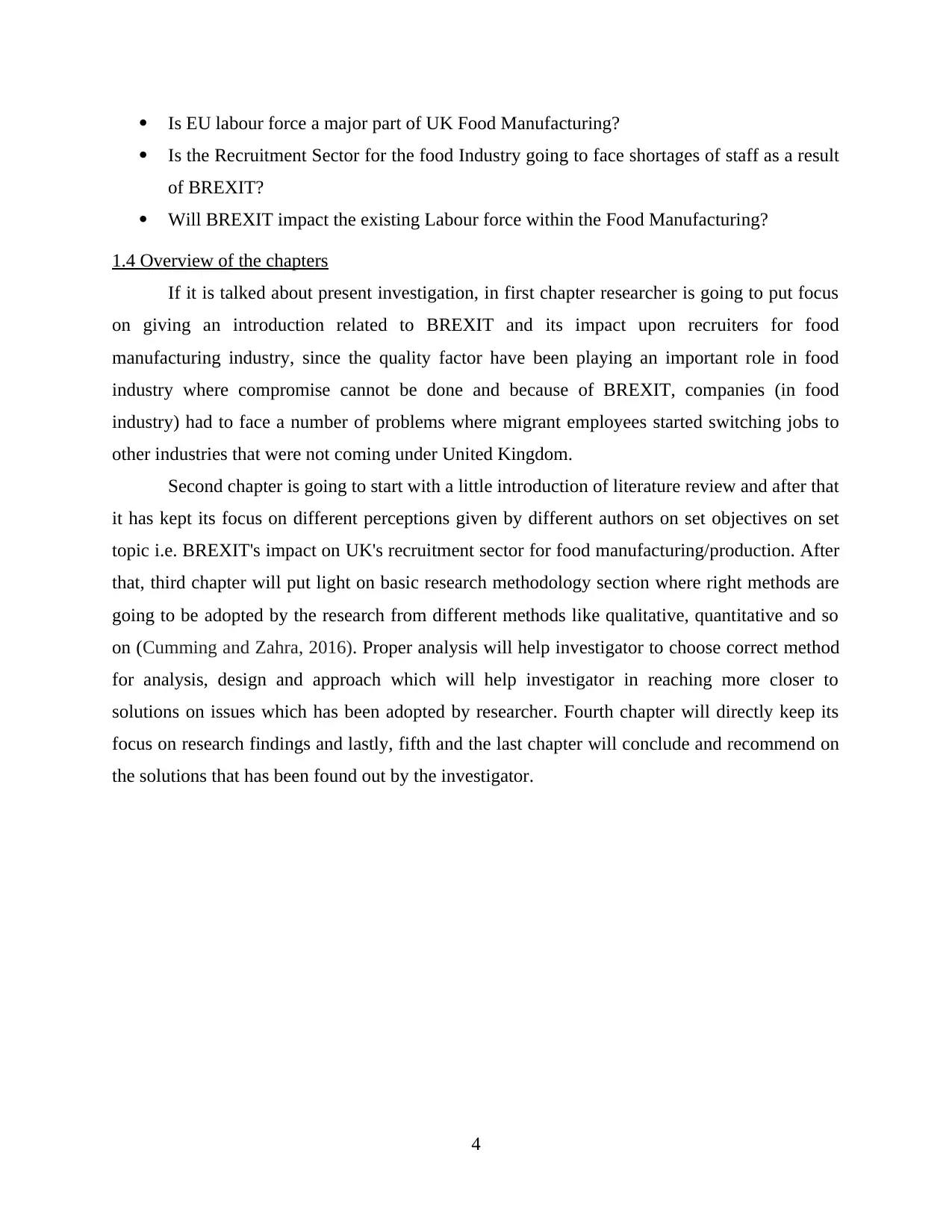
Is EU labour force a major part of UK Food Manufacturing?
Is the Recruitment Sector for the food Industry going to face shortages of staff as a result
of BREXIT?
Will BREXIT impact the existing Labour force within the Food Manufacturing?
1.4 Overview of the chapters
If it is talked about present investigation, in first chapter researcher is going to put focus
on giving an introduction related to BREXIT and its impact upon recruiters for food
manufacturing industry, since the quality factor have been playing an important role in food
industry where compromise cannot be done and because of BREXIT, companies (in food
industry) had to face a number of problems where migrant employees started switching jobs to
other industries that were not coming under United Kingdom.
Second chapter is going to start with a little introduction of literature review and after that
it has kept its focus on different perceptions given by different authors on set objectives on set
topic i.e. BREXIT's impact on UK's recruitment sector for food manufacturing/production. After
that, third chapter will put light on basic research methodology section where right methods are
going to be adopted by the research from different methods like qualitative, quantitative and so
on (Cumming and Zahra, 2016). Proper analysis will help investigator to choose correct method
for analysis, design and approach which will help investigator in reaching more closer to
solutions on issues which has been adopted by researcher. Fourth chapter will directly keep its
focus on research findings and lastly, fifth and the last chapter will conclude and recommend on
the solutions that has been found out by the investigator.
4
Is the Recruitment Sector for the food Industry going to face shortages of staff as a result
of BREXIT?
Will BREXIT impact the existing Labour force within the Food Manufacturing?
1.4 Overview of the chapters
If it is talked about present investigation, in first chapter researcher is going to put focus
on giving an introduction related to BREXIT and its impact upon recruiters for food
manufacturing industry, since the quality factor have been playing an important role in food
industry where compromise cannot be done and because of BREXIT, companies (in food
industry) had to face a number of problems where migrant employees started switching jobs to
other industries that were not coming under United Kingdom.
Second chapter is going to start with a little introduction of literature review and after that
it has kept its focus on different perceptions given by different authors on set objectives on set
topic i.e. BREXIT's impact on UK's recruitment sector for food manufacturing/production. After
that, third chapter will put light on basic research methodology section where right methods are
going to be adopted by the research from different methods like qualitative, quantitative and so
on (Cumming and Zahra, 2016). Proper analysis will help investigator to choose correct method
for analysis, design and approach which will help investigator in reaching more closer to
solutions on issues which has been adopted by researcher. Fourth chapter will directly keep its
focus on research findings and lastly, fifth and the last chapter will conclude and recommend on
the solutions that has been found out by the investigator.
4
Paraphrase This Document
Need a fresh take? Get an instant paraphrase of this document with our AI Paraphraser
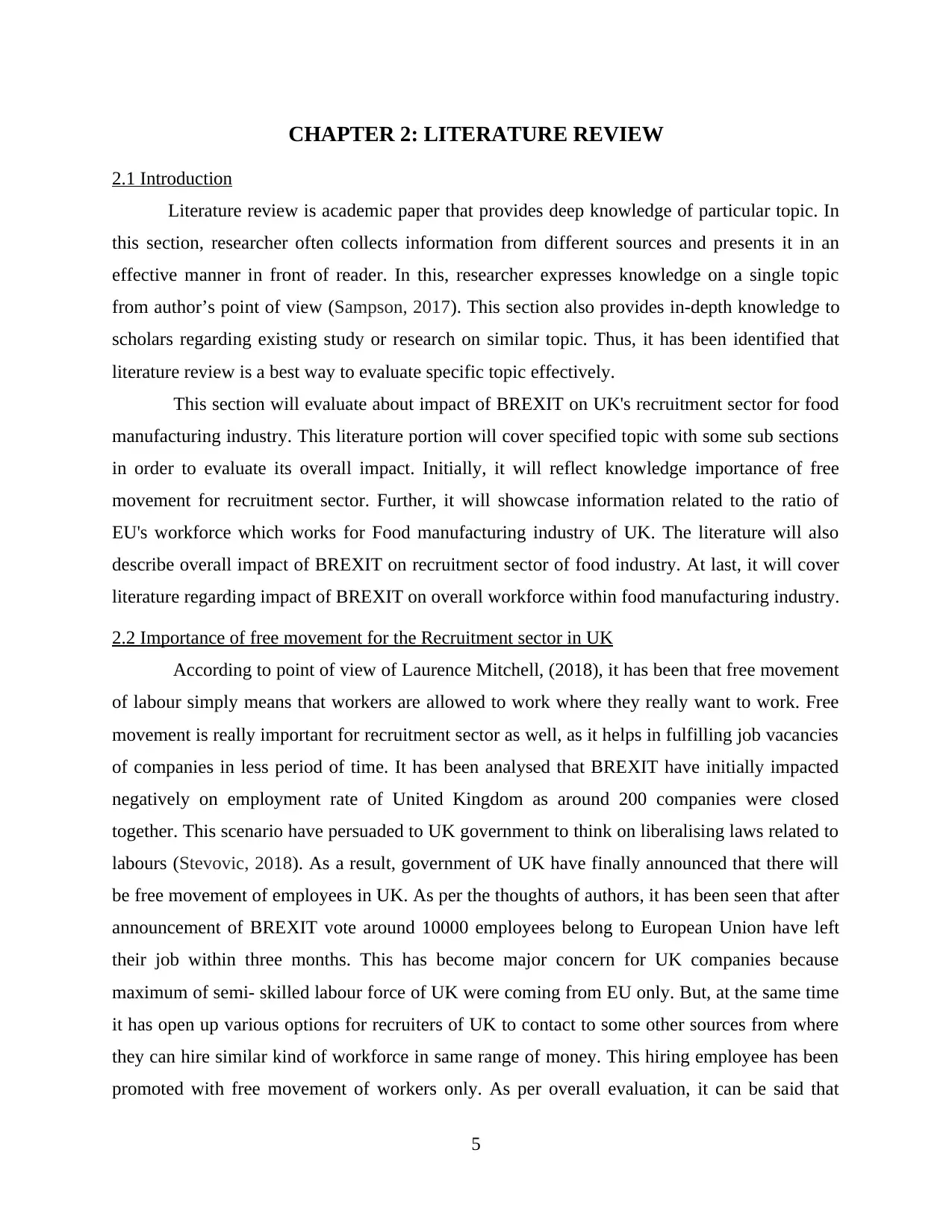
CHAPTER 2: LITERATURE REVIEW
2.1 Introduction
Literature review is academic paper that provides deep knowledge of particular topic. In
this section, researcher often collects information from different sources and presents it in an
effective manner in front of reader. In this, researcher expresses knowledge on a single topic
from author’s point of view (Sampson, 2017). This section also provides in-depth knowledge to
scholars regarding existing study or research on similar topic. Thus, it has been identified that
literature review is a best way to evaluate specific topic effectively.
This section will evaluate about impact of BREXIT on UK's recruitment sector for food
manufacturing industry. This literature portion will cover specified topic with some sub sections
in order to evaluate its overall impact. Initially, it will reflect knowledge importance of free
movement for recruitment sector. Further, it will showcase information related to the ratio of
EU's workforce which works for Food manufacturing industry of UK. The literature will also
describe overall impact of BREXIT on recruitment sector of food industry. At last, it will cover
literature regarding impact of BREXIT on overall workforce within food manufacturing industry.
2.2 Importance of free movement for the Recruitment sector in UK
According to point of view of Laurence Mitchell, (2018), it has been that free movement
of labour simply means that workers are allowed to work where they really want to work. Free
movement is really important for recruitment sector as well, as it helps in fulfilling job vacancies
of companies in less period of time. It has been analysed that BREXIT have initially impacted
negatively on employment rate of United Kingdom as around 200 companies were closed
together. This scenario have persuaded to UK government to think on liberalising laws related to
labours (Stevovic, 2018). As a result, government of UK have finally announced that there will
be free movement of employees in UK. As per the thoughts of authors, it has been seen that after
announcement of BREXIT vote around 10000 employees belong to European Union have left
their job within three months. This has become major concern for UK companies because
maximum of semi- skilled labour force of UK were coming from EU only. But, at the same time
it has open up various options for recruiters of UK to contact to some other sources from where
they can hire similar kind of workforce in same range of money. This hiring employee has been
promoted with free movement of workers only. As per overall evaluation, it can be said that
5
2.1 Introduction
Literature review is academic paper that provides deep knowledge of particular topic. In
this section, researcher often collects information from different sources and presents it in an
effective manner in front of reader. In this, researcher expresses knowledge on a single topic
from author’s point of view (Sampson, 2017). This section also provides in-depth knowledge to
scholars regarding existing study or research on similar topic. Thus, it has been identified that
literature review is a best way to evaluate specific topic effectively.
This section will evaluate about impact of BREXIT on UK's recruitment sector for food
manufacturing industry. This literature portion will cover specified topic with some sub sections
in order to evaluate its overall impact. Initially, it will reflect knowledge importance of free
movement for recruitment sector. Further, it will showcase information related to the ratio of
EU's workforce which works for Food manufacturing industry of UK. The literature will also
describe overall impact of BREXIT on recruitment sector of food industry. At last, it will cover
literature regarding impact of BREXIT on overall workforce within food manufacturing industry.
2.2 Importance of free movement for the Recruitment sector in UK
According to point of view of Laurence Mitchell, (2018), it has been that free movement
of labour simply means that workers are allowed to work where they really want to work. Free
movement is really important for recruitment sector as well, as it helps in fulfilling job vacancies
of companies in less period of time. It has been analysed that BREXIT have initially impacted
negatively on employment rate of United Kingdom as around 200 companies were closed
together. This scenario have persuaded to UK government to think on liberalising laws related to
labours (Stevovic, 2018). As a result, government of UK have finally announced that there will
be free movement of employees in UK. As per the thoughts of authors, it has been seen that after
announcement of BREXIT vote around 10000 employees belong to European Union have left
their job within three months. This has become major concern for UK companies because
maximum of semi- skilled labour force of UK were coming from EU only. But, at the same time
it has open up various options for recruiters of UK to contact to some other sources from where
they can hire similar kind of workforce in same range of money. This hiring employee has been
promoted with free movement of workers only. As per overall evaluation, it can be said that
5
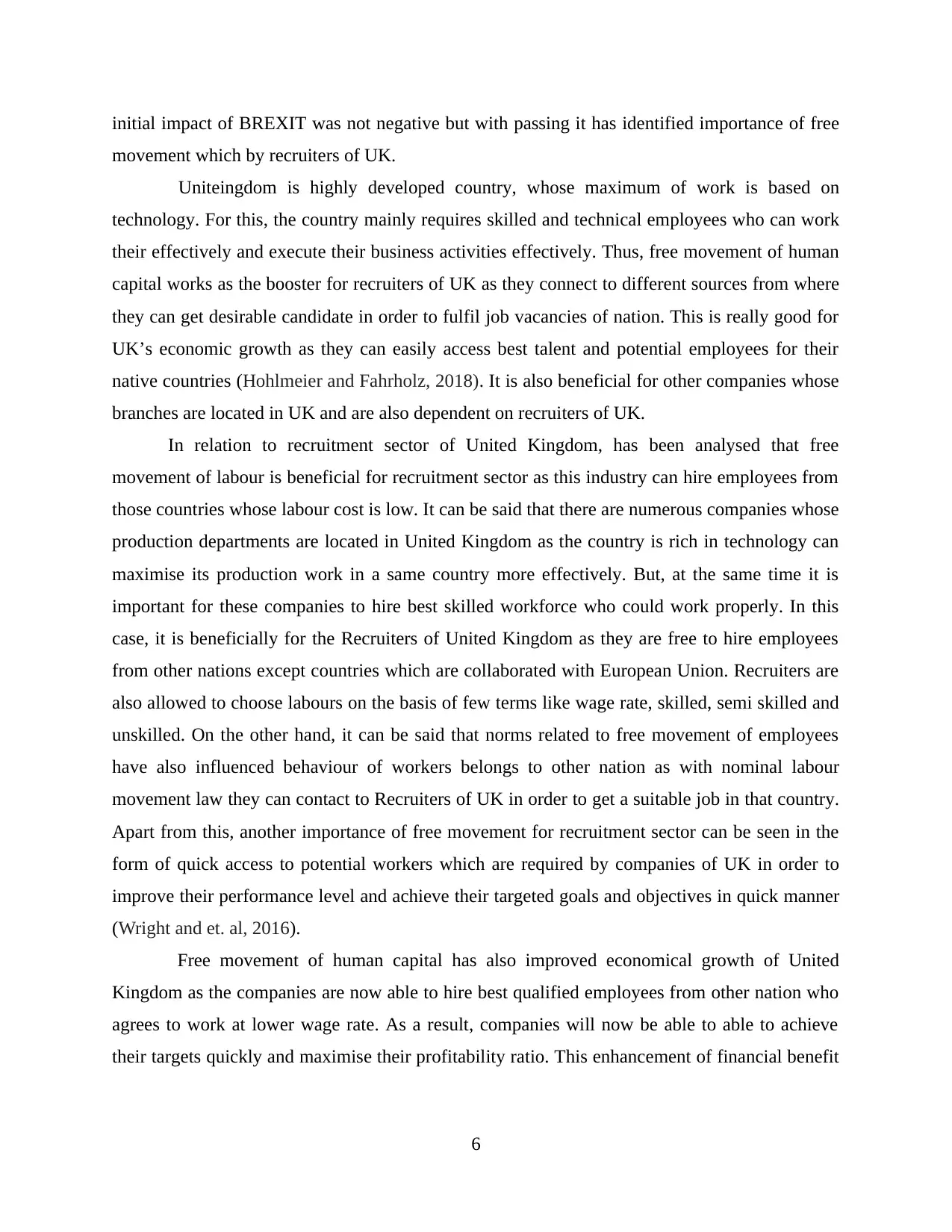
initial impact of BREXIT was not negative but with passing it has identified importance of free
movement which by recruiters of UK.
Uniteingdom is highly developed country, whose maximum of work is based on
technology. For this, the country mainly requires skilled and technical employees who can work
their effectively and execute their business activities effectively. Thus, free movement of human
capital works as the booster for recruiters of UK as they connect to different sources from where
they can get desirable candidate in order to fulfil job vacancies of nation. This is really good for
UK’s economic growth as they can easily access best talent and potential employees for their
native countries (Hohlmeier and Fahrholz, 2018). It is also beneficial for other companies whose
branches are located in UK and are also dependent on recruiters of UK.
In relation to recruitment sector of United Kingdom, has been analysed that free
movement of labour is beneficial for recruitment sector as this industry can hire employees from
those countries whose labour cost is low. It can be said that there are numerous companies whose
production departments are located in United Kingdom as the country is rich in technology can
maximise its production work in a same country more effectively. But, at the same time it is
important for these companies to hire best skilled workforce who could work properly. In this
case, it is beneficially for the Recruiters of United Kingdom as they are free to hire employees
from other nations except countries which are collaborated with European Union. Recruiters are
also allowed to choose labours on the basis of few terms like wage rate, skilled, semi skilled and
unskilled. On the other hand, it can be said that norms related to free movement of employees
have also influenced behaviour of workers belongs to other nation as with nominal labour
movement law they can contact to Recruiters of UK in order to get a suitable job in that country.
Apart from this, another importance of free movement for recruitment sector can be seen in the
form of quick access to potential workers which are required by companies of UK in order to
improve their performance level and achieve their targeted goals and objectives in quick manner
(Wright and et. al, 2016).
Free movement of human capital has also improved economical growth of United
Kingdom as the companies are now able to hire best qualified employees from other nation who
agrees to work at lower wage rate. As a result, companies will now be able to able to achieve
their targets quickly and maximise their profitability ratio. This enhancement of financial benefit
6
movement which by recruiters of UK.
Uniteingdom is highly developed country, whose maximum of work is based on
technology. For this, the country mainly requires skilled and technical employees who can work
their effectively and execute their business activities effectively. Thus, free movement of human
capital works as the booster for recruiters of UK as they connect to different sources from where
they can get desirable candidate in order to fulfil job vacancies of nation. This is really good for
UK’s economic growth as they can easily access best talent and potential employees for their
native countries (Hohlmeier and Fahrholz, 2018). It is also beneficial for other companies whose
branches are located in UK and are also dependent on recruiters of UK.
In relation to recruitment sector of United Kingdom, has been analysed that free
movement of labour is beneficial for recruitment sector as this industry can hire employees from
those countries whose labour cost is low. It can be said that there are numerous companies whose
production departments are located in United Kingdom as the country is rich in technology can
maximise its production work in a same country more effectively. But, at the same time it is
important for these companies to hire best skilled workforce who could work properly. In this
case, it is beneficially for the Recruiters of United Kingdom as they are free to hire employees
from other nations except countries which are collaborated with European Union. Recruiters are
also allowed to choose labours on the basis of few terms like wage rate, skilled, semi skilled and
unskilled. On the other hand, it can be said that norms related to free movement of employees
have also influenced behaviour of workers belongs to other nation as with nominal labour
movement law they can contact to Recruiters of UK in order to get a suitable job in that country.
Apart from this, another importance of free movement for recruitment sector can be seen in the
form of quick access to potential workers which are required by companies of UK in order to
improve their performance level and achieve their targeted goals and objectives in quick manner
(Wright and et. al, 2016).
Free movement of human capital has also improved economical growth of United
Kingdom as the companies are now able to hire best qualified employees from other nation who
agrees to work at lower wage rate. As a result, companies will now be able to able to achieve
their targets quickly and maximise their profitability ratio. This enhancement of financial benefit
6
⊘ This is a preview!⊘
Do you want full access?
Subscribe today to unlock all pages.

Trusted by 1+ million students worldwide
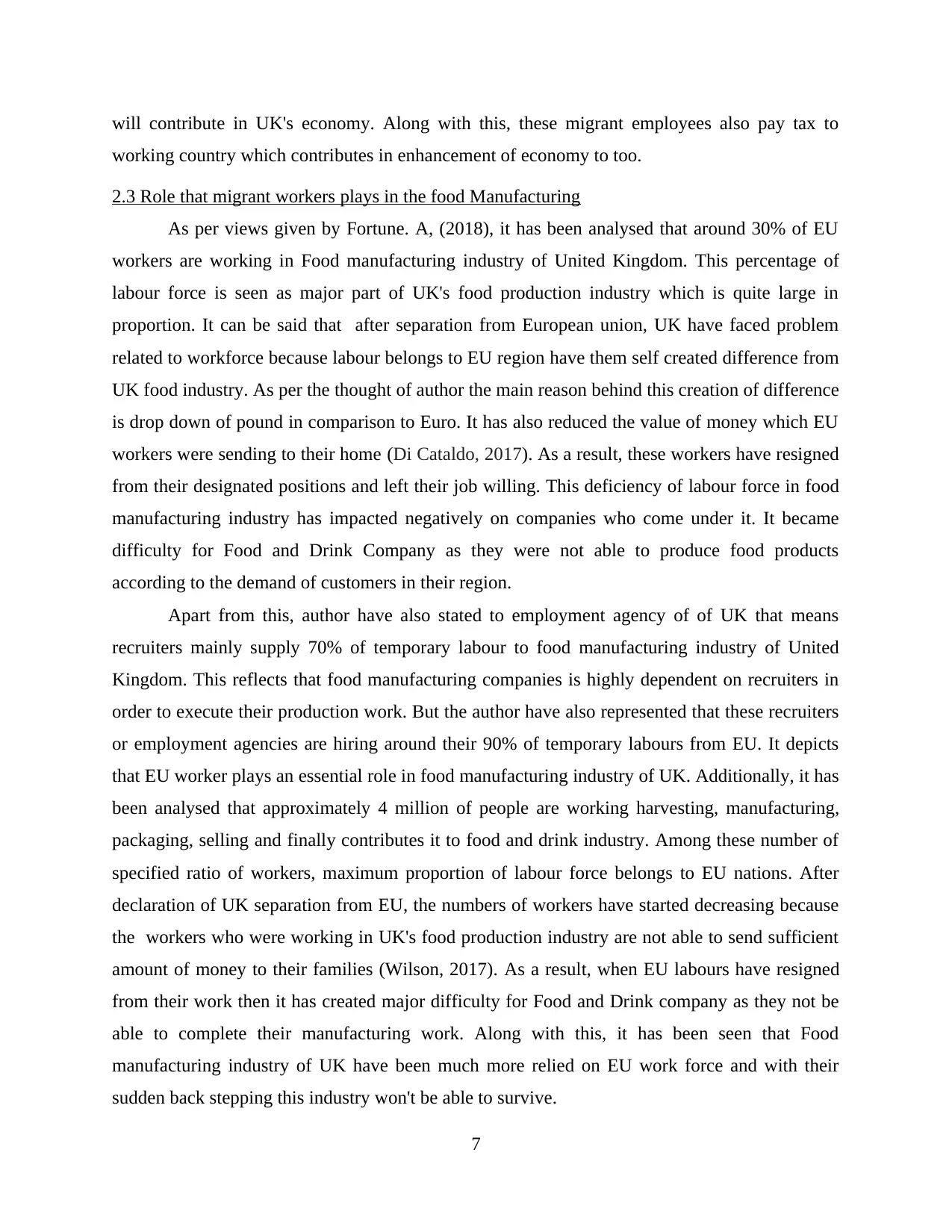
will contribute in UK's economy. Along with this, these migrant employees also pay tax to
working country which contributes in enhancement of economy to too.
2.3 Role that migrant workers plays in the food Manufacturing
As per views given by Fortune. A, (2018), it has been analysed that around 30% of EU
workers are working in Food manufacturing industry of United Kingdom. This percentage of
labour force is seen as major part of UK's food production industry which is quite large in
proportion. It can be said that after separation from European union, UK have faced problem
related to workforce because labour belongs to EU region have them self created difference from
UK food industry. As per the thought of author the main reason behind this creation of difference
is drop down of pound in comparison to Euro. It has also reduced the value of money which EU
workers were sending to their home (Di Cataldo, 2017). As a result, these workers have resigned
from their designated positions and left their job willing. This deficiency of labour force in food
manufacturing industry has impacted negatively on companies who come under it. It became
difficulty for Food and Drink Company as they were not able to produce food products
according to the demand of customers in their region.
Apart from this, author have also stated to employment agency of of UK that means
recruiters mainly supply 70% of temporary labour to food manufacturing industry of United
Kingdom. This reflects that food manufacturing companies is highly dependent on recruiters in
order to execute their production work. But the author have also represented that these recruiters
or employment agencies are hiring around their 90% of temporary labours from EU. It depicts
that EU worker plays an essential role in food manufacturing industry of UK. Additionally, it has
been analysed that approximately 4 million of people are working harvesting, manufacturing,
packaging, selling and finally contributes it to food and drink industry. Among these number of
specified ratio of workers, maximum proportion of labour force belongs to EU nations. After
declaration of UK separation from EU, the numbers of workers have started decreasing because
the workers who were working in UK's food production industry are not able to send sufficient
amount of money to their families (Wilson, 2017). As a result, when EU labours have resigned
from their work then it has created major difficulty for Food and Drink company as they not be
able to complete their manufacturing work. Along with this, it has been seen that Food
manufacturing industry of UK have been much more relied on EU work force and with their
sudden back stepping this industry won't be able to survive.
7
working country which contributes in enhancement of economy to too.
2.3 Role that migrant workers plays in the food Manufacturing
As per views given by Fortune. A, (2018), it has been analysed that around 30% of EU
workers are working in Food manufacturing industry of United Kingdom. This percentage of
labour force is seen as major part of UK's food production industry which is quite large in
proportion. It can be said that after separation from European union, UK have faced problem
related to workforce because labour belongs to EU region have them self created difference from
UK food industry. As per the thought of author the main reason behind this creation of difference
is drop down of pound in comparison to Euro. It has also reduced the value of money which EU
workers were sending to their home (Di Cataldo, 2017). As a result, these workers have resigned
from their designated positions and left their job willing. This deficiency of labour force in food
manufacturing industry has impacted negatively on companies who come under it. It became
difficulty for Food and Drink Company as they were not able to produce food products
according to the demand of customers in their region.
Apart from this, author have also stated to employment agency of of UK that means
recruiters mainly supply 70% of temporary labour to food manufacturing industry of United
Kingdom. This reflects that food manufacturing companies is highly dependent on recruiters in
order to execute their production work. But the author have also represented that these recruiters
or employment agencies are hiring around their 90% of temporary labours from EU. It depicts
that EU worker plays an essential role in food manufacturing industry of UK. Additionally, it has
been analysed that approximately 4 million of people are working harvesting, manufacturing,
packaging, selling and finally contributes it to food and drink industry. Among these number of
specified ratio of workers, maximum proportion of labour force belongs to EU nations. After
declaration of UK separation from EU, the numbers of workers have started decreasing because
the workers who were working in UK's food production industry are not able to send sufficient
amount of money to their families (Wilson, 2017). As a result, when EU labours have resigned
from their work then it has created major difficulty for Food and Drink company as they not be
able to complete their manufacturing work. Along with this, it has been seen that Food
manufacturing industry of UK have been much more relied on EU work force and with their
sudden back stepping this industry won't be able to survive.
7
Paraphrase This Document
Need a fresh take? Get an instant paraphrase of this document with our AI Paraphraser
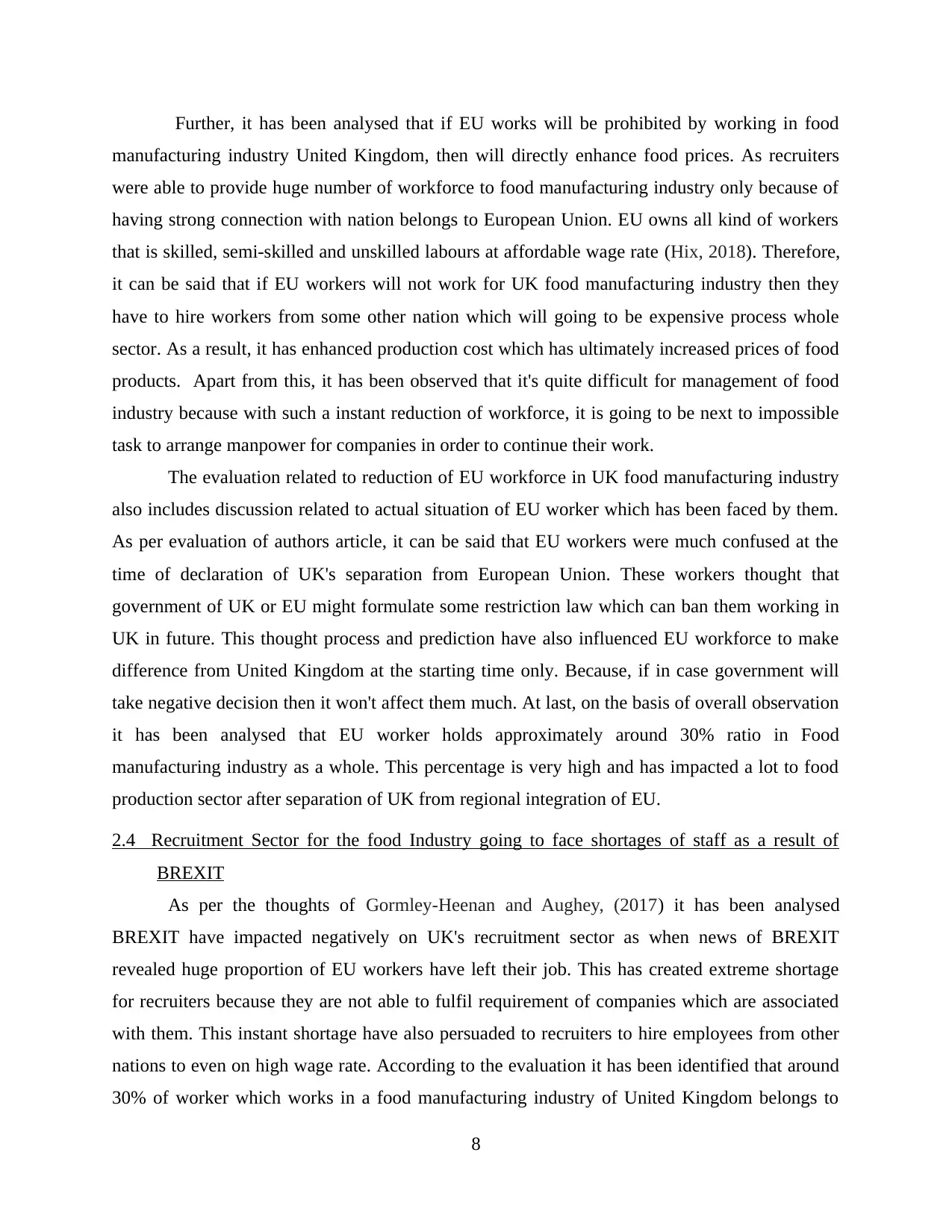
Further, it has been analysed that if EU works will be prohibited by working in food
manufacturing industry United Kingdom, then will directly enhance food prices. As recruiters
were able to provide huge number of workforce to food manufacturing industry only because of
having strong connection with nation belongs to European Union. EU owns all kind of workers
that is skilled, semi-skilled and unskilled labours at affordable wage rate (Hix, 2018). Therefore,
it can be said that if EU workers will not work for UK food manufacturing industry then they
have to hire workers from some other nation which will going to be expensive process whole
sector. As a result, it has enhanced production cost which has ultimately increased prices of food
products. Apart from this, it has been observed that it's quite difficult for management of food
industry because with such a instant reduction of workforce, it is going to be next to impossible
task to arrange manpower for companies in order to continue their work.
The evaluation related to reduction of EU workforce in UK food manufacturing industry
also includes discussion related to actual situation of EU worker which has been faced by them.
As per evaluation of authors article, it can be said that EU workers were much confused at the
time of declaration of UK's separation from European Union. These workers thought that
government of UK or EU might formulate some restriction law which can ban them working in
UK in future. This thought process and prediction have also influenced EU workforce to make
difference from United Kingdom at the starting time only. Because, if in case government will
take negative decision then it won't affect them much. At last, on the basis of overall observation
it has been analysed that EU worker holds approximately around 30% ratio in Food
manufacturing industry as a whole. This percentage is very high and has impacted a lot to food
production sector after separation of UK from regional integration of EU.
2.4 Recruitment Sector for the food Industry going to face shortages of staff as a result of
BREXIT
As per the thoughts of Gormley-Heenan and Aughey, (2017) it has been analysed
BREXIT have impacted negatively on UK's recruitment sector as when news of BREXIT
revealed huge proportion of EU workers have left their job. This has created extreme shortage
for recruiters because they are not able to fulfil requirement of companies which are associated
with them. This instant shortage have also persuaded to recruiters to hire employees from other
nations to even on high wage rate. According to the evaluation it has been identified that around
30% of worker which works in a food manufacturing industry of United Kingdom belongs to
8
manufacturing industry United Kingdom, then will directly enhance food prices. As recruiters
were able to provide huge number of workforce to food manufacturing industry only because of
having strong connection with nation belongs to European Union. EU owns all kind of workers
that is skilled, semi-skilled and unskilled labours at affordable wage rate (Hix, 2018). Therefore,
it can be said that if EU workers will not work for UK food manufacturing industry then they
have to hire workers from some other nation which will going to be expensive process whole
sector. As a result, it has enhanced production cost which has ultimately increased prices of food
products. Apart from this, it has been observed that it's quite difficult for management of food
industry because with such a instant reduction of workforce, it is going to be next to impossible
task to arrange manpower for companies in order to continue their work.
The evaluation related to reduction of EU workforce in UK food manufacturing industry
also includes discussion related to actual situation of EU worker which has been faced by them.
As per evaluation of authors article, it can be said that EU workers were much confused at the
time of declaration of UK's separation from European Union. These workers thought that
government of UK or EU might formulate some restriction law which can ban them working in
UK in future. This thought process and prediction have also influenced EU workforce to make
difference from United Kingdom at the starting time only. Because, if in case government will
take negative decision then it won't affect them much. At last, on the basis of overall observation
it has been analysed that EU worker holds approximately around 30% ratio in Food
manufacturing industry as a whole. This percentage is very high and has impacted a lot to food
production sector after separation of UK from regional integration of EU.
2.4 Recruitment Sector for the food Industry going to face shortages of staff as a result of
BREXIT
As per the thoughts of Gormley-Heenan and Aughey, (2017) it has been analysed
BREXIT have impacted negatively on UK's recruitment sector as when news of BREXIT
revealed huge proportion of EU workers have left their job. This has created extreme shortage
for recruiters because they are not able to fulfil requirement of companies which are associated
with them. This instant shortage have also persuaded to recruiters to hire employees from other
nations to even on high wage rate. According to the evaluation it has been identified that around
30% of worker which works in a food manufacturing industry of United Kingdom belongs to
8
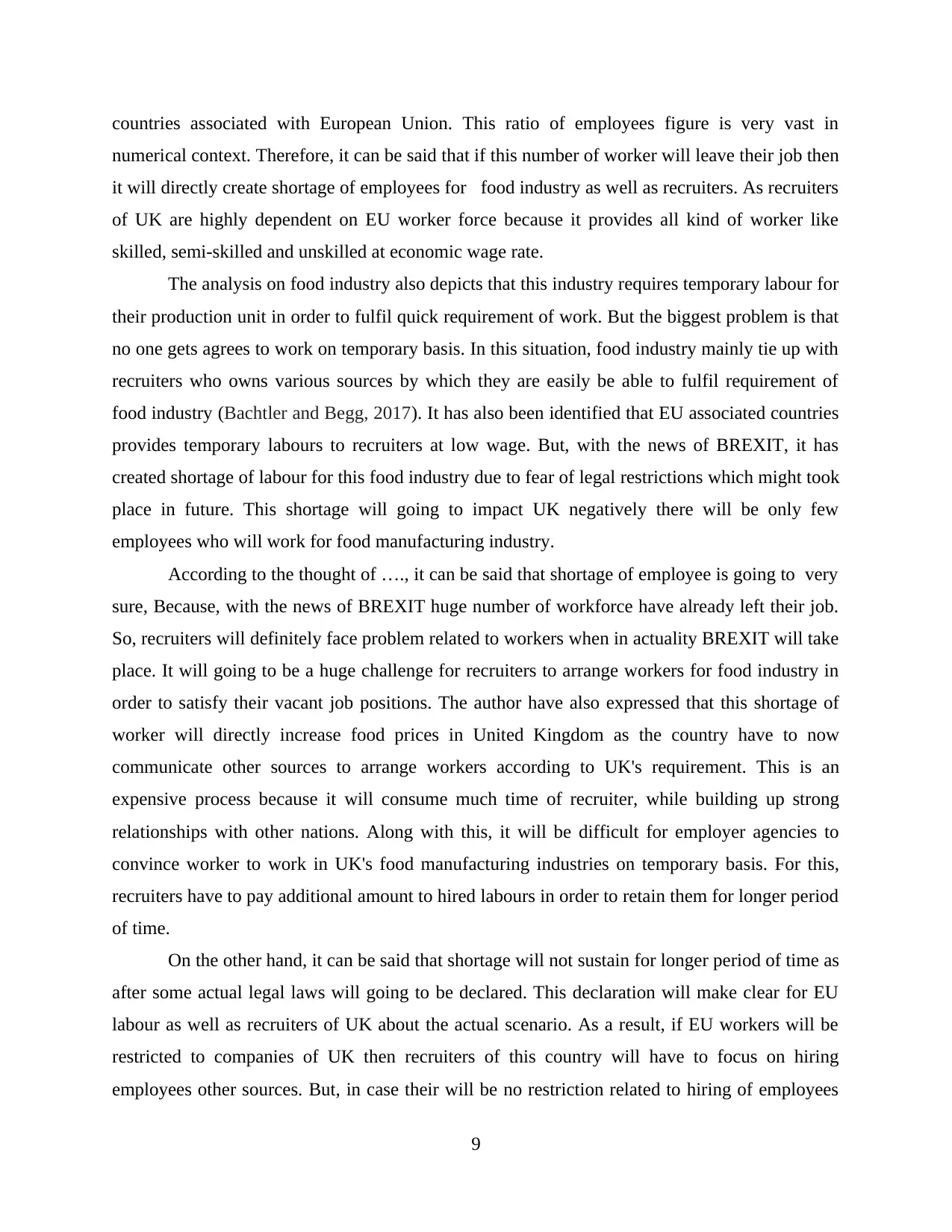
countries associated with European Union. This ratio of employees figure is very vast in
numerical context. Therefore, it can be said that if this number of worker will leave their job then
it will directly create shortage of employees for food industry as well as recruiters. As recruiters
of UK are highly dependent on EU worker force because it provides all kind of worker like
skilled, semi-skilled and unskilled at economic wage rate.
The analysis on food industry also depicts that this industry requires temporary labour for
their production unit in order to fulfil quick requirement of work. But the biggest problem is that
no one gets agrees to work on temporary basis. In this situation, food industry mainly tie up with
recruiters who owns various sources by which they are easily be able to fulfil requirement of
food industry (Bachtler and Begg, 2017). It has also been identified that EU associated countries
provides temporary labours to recruiters at low wage. But, with the news of BREXIT, it has
created shortage of labour for this food industry due to fear of legal restrictions which might took
place in future. This shortage will going to impact UK negatively there will be only few
employees who will work for food manufacturing industry.
According to the thought of …., it can be said that shortage of employee is going to very
sure, Because, with the news of BREXIT huge number of workforce have already left their job.
So, recruiters will definitely face problem related to workers when in actuality BREXIT will take
place. It will going to be a huge challenge for recruiters to arrange workers for food industry in
order to satisfy their vacant job positions. The author have also expressed that this shortage of
worker will directly increase food prices in United Kingdom as the country have to now
communicate other sources to arrange workers according to UK's requirement. This is an
expensive process because it will consume much time of recruiter, while building up strong
relationships with other nations. Along with this, it will be difficult for employer agencies to
convince worker to work in UK's food manufacturing industries on temporary basis. For this,
recruiters have to pay additional amount to hired labours in order to retain them for longer period
of time.
On the other hand, it can be said that shortage will not sustain for longer period of time as
after some actual legal laws will going to be declared. This declaration will make clear for EU
labour as well as recruiters of UK about the actual scenario. As a result, if EU workers will be
restricted to companies of UK then recruiters of this country will have to focus on hiring
employees other sources. But, in case their will be no restriction related to hiring of employees
9
numerical context. Therefore, it can be said that if this number of worker will leave their job then
it will directly create shortage of employees for food industry as well as recruiters. As recruiters
of UK are highly dependent on EU worker force because it provides all kind of worker like
skilled, semi-skilled and unskilled at economic wage rate.
The analysis on food industry also depicts that this industry requires temporary labour for
their production unit in order to fulfil quick requirement of work. But the biggest problem is that
no one gets agrees to work on temporary basis. In this situation, food industry mainly tie up with
recruiters who owns various sources by which they are easily be able to fulfil requirement of
food industry (Bachtler and Begg, 2017). It has also been identified that EU associated countries
provides temporary labours to recruiters at low wage. But, with the news of BREXIT, it has
created shortage of labour for this food industry due to fear of legal restrictions which might took
place in future. This shortage will going to impact UK negatively there will be only few
employees who will work for food manufacturing industry.
According to the thought of …., it can be said that shortage of employee is going to very
sure, Because, with the news of BREXIT huge number of workforce have already left their job.
So, recruiters will definitely face problem related to workers when in actuality BREXIT will take
place. It will going to be a huge challenge for recruiters to arrange workers for food industry in
order to satisfy their vacant job positions. The author have also expressed that this shortage of
worker will directly increase food prices in United Kingdom as the country have to now
communicate other sources to arrange workers according to UK's requirement. This is an
expensive process because it will consume much time of recruiter, while building up strong
relationships with other nations. Along with this, it will be difficult for employer agencies to
convince worker to work in UK's food manufacturing industries on temporary basis. For this,
recruiters have to pay additional amount to hired labours in order to retain them for longer period
of time.
On the other hand, it can be said that shortage will not sustain for longer period of time as
after some actual legal laws will going to be declared. This declaration will make clear for EU
labour as well as recruiters of UK about the actual scenario. As a result, if EU workers will be
restricted to companies of UK then recruiters of this country will have to focus on hiring
employees other sources. But, in case their will be no restriction related to hiring of employees
9
⊘ This is a preview!⊘
Do you want full access?
Subscribe today to unlock all pages.

Trusted by 1+ million students worldwide
1 out of 40
Related Documents
Your All-in-One AI-Powered Toolkit for Academic Success.
+13062052269
info@desklib.com
Available 24*7 on WhatsApp / Email
![[object Object]](/_next/static/media/star-bottom.7253800d.svg)
Unlock your academic potential
Copyright © 2020–2026 A2Z Services. All Rights Reserved. Developed and managed by ZUCOL.





